- Home
- Kate Quinn
The Rose Code Page 6
The Rose Code Read online
Page 6
That wouldn’t be a problem, Osla reflected. Philip never mentioned his mother. He’d talk about his sisters, the ones who had married Nazis and to whom he could no longer write; he’d talk about the sister who died in a plane crash with her entire family a few years ago; he’d even mention his long-estranged father—but never his mother.
“So, your shipboard friend—” A nudge. “Fiancé?”
“Oh, just a boyfriend,” Osla murmured, banging away at the punching machine. She’d had boyfriends since she was sixteen, casual crushes conducted over late-night dancing and the occasional kiss in the back of a taxi. Nothing serious. Philip had gone to sea in February; they’d barely known each other six weeks—dancing at the Café de Paris when Osla got a night off from the Hurricane factory; long evenings when he’d drive to her shared digs and lie with his head in her lap as they listened to gramophone records and chatted the night away. “Are you falling for your handsome prince?” Sally Norton teased one evening after Philip ambled out after midnight.
“He’s not my prince,” Osla retorted. “He’s looking for a girl to splash out with before going to war, that’s all. For me, he’s just another boyfriend.”
Except Philip was the only one who made her bones burn. The first kisses of her life that felt dangerous. The last night before he’d shipped out, he’d gripped her hand tighter than usual and said abruptly, “Write to me, Os? If you do, I’ll write to you. I haven’t anyone to write to, really.”
“I’ll write,” Osla had said, no jokes, no teasing.
He leaned in for another of those long, heated doorstep kisses, the ones that went on and on, his hands moving across her back, her fingers deep in his hair. Before he pulled away, he pressed something into her hand and then leaned down and crushed his lips to her folded fingers for a long moment. “So long, princess.”
She’d opened her hand and seen the cool glitter of his naval insignia like a little jeweled pin. As she fastened it to her lapel like a brooch, she warned herself again, Careful. Her mother spent all her time making a mug of herself over unsuitable men, and Osla was determined to be the apple who fell a long way from that tree.
Someone came over, a scholarly type in an unraveling jumper, interrupting Osla’s musings. “Give me a hand, girls? I need this report . . .” And he rattled off a series of numbers.
“Make him out a copy, dear,” Miss Senyard directed, pulling the report, and Osla obeyed as the man nearly danced on his toes with impatience. Osla remembered red-haired Giles saying the Park was stuffed with Oxford dons and Cambridge chess champions, and wondered where he worked—if he was one of the brainy ones working the middle stage of this process: taking the raw gibberish from German radio traffic, the stuff they were registering and logging, and breaking it apart until it was something that could be read, translated, analyzed, and filed in sections like this one.
“Thanks.” The man flew off with his copied report, leaving Osla feeling both pleased and deflated, and she went back to binding and filing signals. She had absolutely no idea what had just happened, why that one report had been needed, and she never would know. That was all right; it was important to someone, and she’d played her part . . . but there wasn’t any doubt this job was a lot simpler than she’d hoped for. The pace might have been frenetic, but anyone with a teaspoon of brains and a little attention to detail could bind and file.
Dear Philip: Am I an ungrateful cow if I’ve gone from wishing I could do more for the war than bang sheets of Dural, to wishing I could do more for the war than wield a punching machine?
“My job’s a yawn, so let’s hear about yours,” Osla told her billet-mate that night. Mab had just slipped in from the outdoor loo, and Osla lay across her narrow bed in slip and knickers, trying to get in a chapter of Vanity Fair before lights-out. “Day one—how was it?”
“Not bad.” Mab stripped out of the robe she’d donned to go downstairs, standing in her own slip and knickers. “Can’t say much more than that, can I? All this secrecy; are we even allowed to ask each other ‘How’s work?’” Mab’s slip was nylon and very worn. Osla, in peach silk with French lace inserts, remembered the girls of her deb season tittering about the poor girls, by which they meant the ones who wore the same frock twice in one week . . . she’d watched Mab unpack exactly four dresses from her suitcase into their shared wardrobe, all perfectly pressed, and felt self-conscious unpacking more than four of her own.
“Mind you,” Mab went on, picking up her hairbrush, “I don’t think our nosy landlady cares about secrecy. Did you see her pursing her lips over supper when we wouldn’t answer every question?”
“And good luck to anyone else trying to get a word in.” Osla had tried to ask the washed-out daughter a thing or two, but the poor mouse hadn’t uttered a peep around her mother’s peppering questions. Osla still wasn’t sure if the girl’s name was Beth or Bess. She wondered if she could get by with darling through the entire war.
“I’ll tell you one thing about my hut.” Mab’s hair crackled as she stroked the brush vigorously through it. “It’s got my future husband in it somewhere. I’ve never seen so many eligible bachelors in my life.”
“Oooh. Glamour boys?”
“I said eligible, not glamorous.” Mab gave that grin of hers, the one that cracked the cool, guarded expression on her rather severe face and made her look like a pirate who had spotted a Spanish treasure galleon on the horizon. HMS Queen Mab, out to chase and board the unsuspecting bachelors of Bletchley Park, thought Osla. “Anyone in your hut catch your eye?”
“Oh, I’m not looking for a fellow,” Osla said airily.
Dear Philip: It’s a madhouse, and maybe my job’s a touch undemanding . . . but I think I like it here.
Chapter 7
June 1940
If Bletchley Park had a motto, Mab thought, it would be You dinnae need to know.
“Are the other huts set up like this one?” Mab asked as she was whisked through the central corridor of Hut 6.
“You dinnae need to know,” said her new supervisor, a middle-aged woman with a crisp Scottish voice. “You’re assigned to the Decoding Room . . .” And she ushered Mab into a box of a place, all lino and blackout curtains, filing cabinets and wooden trestle tables. But it was the two machines that made Mab stare: awkward composite things bristling with three rows of keys, a set of wheels on one side, big spools of tape somehow attached. Mab thought they looked like a cross between a typewriter, a shop till, and a telephone switchboard. A woman sat hammering at one of the machines, hunched like Quasimodo (The Hunchback of Notre Dame had been number 34 on “100 Classic Literary Works for the Well-Read Lady”).
“Miss Churt, is it?” The Scotswoman led Mab to the unoccupied machine. “Most of our girls are Newnham College or Girton College; where did you graduate?”
“Claybourn secretarial course, top of my class.” Take that, Girton College. Mab wasn’t going to be embarrassed by her lack of schooling any more than she was going to be embarrassed by her nylon underwear in the face of Osla’s French lace slips.
“I suppose it disnae matter,” the Scotswoman said dubiously. “This is your Typex machine. It’s mocked up to decipher the encrypted messages the Germans send by radio to their officers in the field. Each service of the German armed forces sends those messages using a service-specific key, over their own wireless networks, and the settings of that key are changed daily. Our listening stations across Britain and abroad intercept these messages, transcribe them, and send them to BP. By the time they make their way to the Decoding Room, they are given to you as coded messages.” She held up one finger. “You will be given settings, a different setting for each key”—a second finger—“you will align your machine to those settings”—a third finger—“and you will punch the coded messages into the machine so they can be decoded into German. Do you understand?”
Not really. “Yes, of course.”
“You’ll get an hour at noon for dinner, and there is a toilet block outside. T
his hut works round the clock, Miss Churt. Fourteen days on the nine-to-four, then fourteen days on the four-to-midnight, then twelve days on the midnight-to-nine.”
The Scotswoman bustled off to some other compartment of Hut 6. The girl at the other Typex machine, snail-hunched in a pebbly jumper, slid a stack of papers over as Mab took her seat. “That’s the rest of the day’s Red,” she said without preamble. “Bit late today. The boys in Hut 3 get tetchy if we haven’t got it for them by breakfast. Here’s the setting.” She showed Mab how to fix up her Typex machine for decoding Red traffic: the order for the three wheels; then something she called the Ringstellung, rattling off numbers that each equated to a letter of the alphabet . . . Mab followed along, head swimming. “Then a check to be sure the setup’s correct; set each of your three wheels to A and type out a keyboard alphabet. If it corresponds exactly letter for letter, you’re ready to start. See?”
Not really. “Yes, of course.”
“Now you just bang through each message as fast as you can.” Indicating the big spools of tape attached to the Typex. “Type in the encrypted stuff, and it’ll feed out in plain-text letters. If it looks like German, pass it on. If it looks like rubbish, put it aside and one of the more experienced girls will take a second crack at it.”
“I don’t speak German—”
“You don’t have to. Just recognize it. The tricky part is looking past the five-letter clumps everything is sorted into, but you’ll get the knack.”
Mab stared at the stack. “We’ll never get through all of this.”
“Up to a thousand messages a day in Red since France was overrun,” the girl said, which made Mab feel no more confident. Slowly she picked up the first message. Blocks of letters: ACDOU LMNRS TDOPS—on like that for a whole page. Mab looked at her partner, hunched over her own identical sheet of nonsensical five-letter groups, and wondered what Lucy was doing, back home. I shouldn’t have left you for this, Luce. You’re alone with Mum in a city that’s going to get bombed any day, and I’m stuck in a hut typing ruddy nonsense.
But there wasn’t any use whining about it, so Mab squared her shoulders, typed a few letter groups that the other girl had said were the introduction and signatory, then began on the main message: ACDOU LMNRS TDOPS FCQPN YHXPZ . . . To her surprise, the letters came out different: KEINE BESON DEREN EREIG NISSE.
“Keine besonderen Ereignisse,” said the girl to Mab’s left. “You’ll see that one now and then. I know a bit of German by now—it means ‘no special developments.’”
Mab stared at the message. No special developments. So this message wasn’t too important, then . . . or maybe it was. Maybe it came from an area where developments were expected. Maybe that was critical news. She kept typing, and the machine kept spitting out five-letter clumps of German until the end. “What do we do with these when—”
“Write the final position of the wheels under the message setting, sign it, stick the original decrypt to it, and put it in that tray. Keep going through your stack—things will get slow later, but we’re in a rush now to get all the Red decoded.”
“What is Red? If I can ask.”
“Red’s the key for German air force communications.”
“Why Red?” Mab asked, fascinated.
A shrug. “It was the colored pencil the boffins were using when they were first figuring out how to crack it. We’ve also got Green, Blue, Yellow—all different keys for different traffic.”
“Who are the boffins?”
“The brainy boys who make the initial breaks. They work out the setting for each cipher—if they didn’t, we wouldn’t know how to set our machines to decode all the messages.” Patting the Typex’s three wheels. “The Jerries change the settings every day, so every night shift as midnight ticks over, the boffins start all over again, figuring out the new setting for every—single—key.”
“How?”
“Who knows? However they do it, we decode it and then it moves off to Hut 3 for translating and analysis.”
Mab supposed that was what the German-speaking girls like Osla did: take this mess of German in five-letter blocks and turn it into nice legible English reports. Air force communications, army communications, intercepted at distant listening stations (whatever those were—Mab imagined men in headphones listening in on German radio channels, jotting Morse madly), then whirled through the various Bletchley huts so university boys could crack them open, so typing-pool girls like Mab could decode them, so bilingual girls like Osla could translate them. Like a conveyor belt at a factory. We’re reading your post, Mab thought, picking up the next report. Take that, Herr Hitler.
She hammered another message out on the Typex, taped and processed it, reached for another. By noon she had the knack of scanning those five-letter clumps, seeing which were rubbish and which were German. Her back hurt from curling into a C, her fingers were sore from hammering the stiff keys, but she was smiling. Look at me, she thought. Mabel from Shoreditch, decoding ruddy Nazi intelligence. Mum would never have believed it, even if Mab had been able to tell her.
It was two more days before Mab got a look at the men her seatmate called the boffins.
“This box of pencils and supplies is for the boys in the next room. Miss Churt, take it over.” Mab obeyed, dying for a look at the other denizens of Hut 6.
Stalky, red-haired Giles Talbot answered her knock.
“Oh, it’s you! ‘Divinely tall goddess—’”
“Tennyson,” she said, pleased to recognize the quote.
He grinned up at her. “Don’t tell me you ended up in our ring of the Inferno, Miss Churt?”
“Decoding Room,” Mab answered, reflecting that it was strange to see Giles in trousers, not just white legs stuck all over with duckweed. “Do make it Mab, not Miss Churt.”
“If you’ll make it Giles, O faerie queene—”
“Spenser! And yes, I will.” Mab handed the box of supplies over, looking around. Another stuffy room crammed with men hunched over desks, every surface heaped with scraps of paper, pencil stubs, and jumbled strips of letters. The fog of concentration in the room was as thick as the fug of cigarette smoke as the men muttered and scribbled. They looked like they were at the absolute end of their tether, like they’d fallen off another planet. But Mab would eat her hat if these weren’t the brainy boys who cracked the keys . . . and she’d bet they were all Cambridge or Oxford boys, too. Her hopes rose. University degrees weren’t exactly thick on the ground in Shoreditch.
Of course, a good university didn’t mean a good man. Mab of all people knew that. She shoved that particular memory away before it could curdle her stomach into an icy ball, down, down, bloody go away—and smiled at the roomful of potential husbands. Just let one of you be nice as well as educated and gentlemanly, and I will make you the best bloody wife you ever dreamed of.
“What’s a girl to do for fun round here when shift’s over?” Mab asked Giles with a dazzling smile.
“There are more recreation clubs here than you can shake a stick at. Highland dancing, chess—”
“I’m not one for reels or game boards. Do you like books? Osla Kendall and I are starting a literary society—”
“Love a good yarn. I’m your man.”
Maybe you are, thought Mab, who had made up the literary society on the spot. Not the lure she’d have used for the lads back home, but in this crowd . . . “First meeting Sunday next. Bring the boys.” She aimed another smile round the room and went back to her Typex.
“I’m knackered,” Osla groaned when Sunday next finally arrived. “The work’s not hard, but every day it feels like the pace doubles.”
“My hut, too.” If it had been peacetime, the frenetic rate of the work would have given Mab thoughts of transferring elsewhere, but with a war on, all you could do was grit your teeth. She reached up to fluff her hair. “Forget the work for a night. It’s time for fun.” The Shoulder of Mutton inn was to host the first meeting of the Bletchley Park Literary Society—Giles
said their fish and chips weren’t to be missed, and after Mrs. Finch’s leaden stews, fish and chips sounded like heaven.
“I nabbed a fellow for tonight’s meeting, by the way—just for you.” Osla too sounded like she was determinedly putting her very long week behind her, along with the war and everything else unpleasant. “He’s Hut 8, simply scrumptious. The tallest thing you’ve ever seen; positively made for a six-foot wife. You won’t be stuck in flats your entire life.”
“I don’t mind men who are shorter than me. I mind men who are touchy about being shorter than me.”
“What about Giles, then? He’s too much the jester to get in a wax about anything, much less tall women.”
“Something tells me he’s the bachelor type . . . we’ll see after tonight.” Mab grinned. “The nice thing about meeting men here is that they can’t drone about what they do. They actually have to talk about books or the weather—”
“Or, God forbid, ask you a question or two about yourself.” Osla grinned back, swinging her crocodile handbag. “Are you heading chez Finch first to change?”
“Yes, red print frock.”
“You’ll look slap-up. I don’t think I’ll bother changing, just nip straight there all scruffy and ink stained, and no one will look at me when you swan in.”
Osla could roll in a gutter and still everyone would look at her, Mab thought. Even at the end of a very long shift, she looked rumpled and adorable rather than frazzled and exhausted. It should have been easy to resent Osla, but Mab couldn’t quite manage it. How could you resent a girl who scouted men over six feet tall for another girl’s husband pool?
“There you are,” Mrs. Finch greeted Mab as she came into the scrubbed kitchen. “Working on a Sunday, I see.”
“No rest when there’s a war on, Mrs. F.” Mab tried to slide past, but Mrs. Finch blocked her way.
“Now why won’t you just give us a hint what you do?” she said with a little laugh. “What do you all get up to behind those gates, my goodness—”

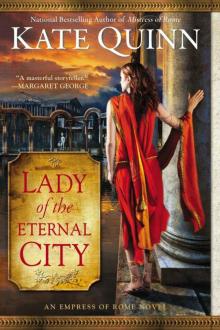 Lady of the Eternal City
Lady of the Eternal City Mistress of Rome
Mistress of Rome Daughters of Rome
Daughters of Rome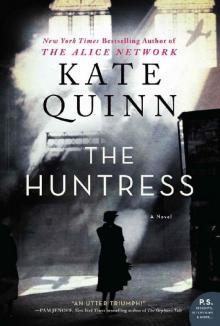 The Huntress
The Huntress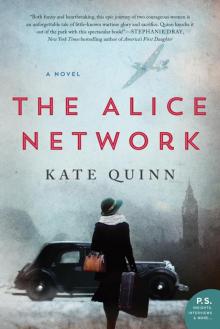 The Alice Network
The Alice Network The Lion and the Rose
The Lion and the Rose Empress of the Seven Hills
Empress of the Seven Hills The Serpent and the Pearl
The Serpent and the Pearl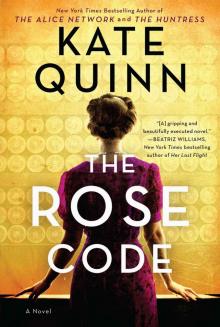 The Rose Code
The Rose Code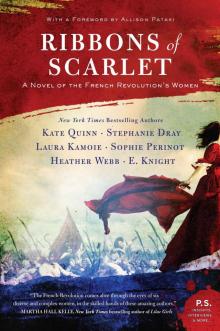 Ribbons of Scarlet
Ribbons of Scarlet A Song of War: a novel of Troy
A Song of War: a novel of Troy